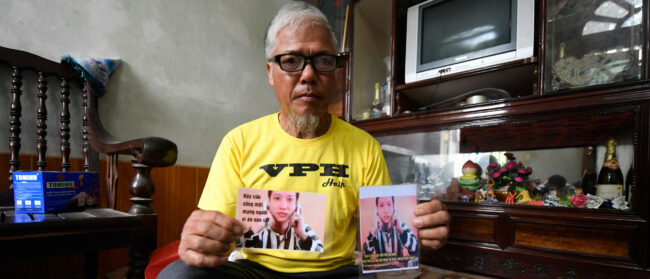Tom Smith is a Principal Lecturer in International Relations at the University of Portsmouth in the UK. He lived and taught in the Philippines at De La Salle University in Manila. The views expressed in this op-ed do not necessarily reflect those of the Globe.
Maria Ressa’s conviction on cyber libel charges on June 15 has rightly been widely reported around the world. However, this media appetite for celebrity cases like this risks further masking the story’s that journalists need to be telling.
Ressa’s case is largely symbolic and not reflective of the true extent of the assault on media freedom that regularly sees lesser known Filipino journalists murdered by the government of Rodrigo Duterte.
On June 12 Ressa’s high-profile attorney Amal Clooney was forewarning in the Washington Post:
If Maria is convicted and locked up for doing her work, the message to other journalists and independent voices is clear: Keep quiet, or you’ll be next. Let’s hope that on Monday a trial judge in Manila will send a very different message. And that if she doesn’t, we will see a robust response.
Ressa and Clooney have no difficulty getting international media attention. Their global profiles were in place before Duterte even took office in 2016. However, it is their profile, as prominent and influential women holding power to account, that in part makes them targets of Duterte’s pervasive political power.
Ressa and Clooney trade in a global currency that has no value in Duterte’s Philippines. Their cache is with metropolitan, cosmopolitan Western capitals who thus far have shown little appetite to intervene on the many deadly acts of the Duterte regime.
As I wrote about in the Globe last month, Duterte’s grip on the judiciary was proven in the closure of ABS-CBN and so the judge’s decision in Ressa’s case is of no surprise. It is unlikely to be the end of either her or her trials as she faces a further raft of trumped up charges that do not merit describing in detail, but range from tax fraud to illegal foreign ownership in her companies.
The conviction will be widely reported and is easily condemned but therein lies the problem. Duterte doesn’t care, his currency is in brazen aggressive acts against those he sees as enemies. It’s what he trades upon. The liberal circles that Clooney and Ressa move in are not just separate tribes from those of Duterte, his cronies and vocal online supporters. They are sworn enemies – enemies that somewhat enable one another and feed on each other. Common ground has long been lost and the courts are no recourse where the merits of argument can be fairly heard.
Maria Ressa was Time Magazine’s person of the year in 2018, and in the BBCs top 100 women in 2019. She has received several awards for her journalism and is justly fated across international liberal institutions. She is the lightning rod for the western liberal support and for Duterte’s ire at a critical media. Who do all these accolades serve though?
Last July the UK government invited Ressa and Clooney to its Media Freedom conference where I was in attendance along with members of the UK chapter of Campaign Group for Human Rights in the Philippines. In the months leading up to the conferences, we had met with officials and organisers of the UK Foreign Office to warn them of being dazzled by Ressa’s celebrity and urged them to invite frontline Filipino journalists fearful for their lives instead. They didn’t heed our advice.
145 journalists and media workers have been killed in the Philippines since 1992. None of their names will be familiar to you. Very few of the stories of their killings will be either
Ressa came and went, Amal Clooney spoke eloquently and became Britain’s special envoy on media freedom. In a tragic twist though during the conference we learned that a Filipino journalist – Eduardo Dizon – had been murdered in Cotabato, Mindanao in the south of the Philippines on July 10. We raised the issue of this death as soon as we heard at the conference. It was all so very lacking in ideas and substance.
Other than Al Jazeera who continue to cover the Philippines excellently, you will struggle find coverage of Dizon’s murder from outlets outside the region, and sadly little has been reported since his death almost a year ago. Dizon sadly becomes a mere statistic among those collated by the Committee to Protect Journalists (CPJ) on this terrible trend.
CPJ records show that 145 journalists and media workers have been killed in the Philippines since 1992. None of their names will be familiar to you. Very few of the stories of their killings will be either – perhaps save for the Ampatuan massacre in 2009 in Maguindanao where 34 journalists were massacred in the run up to the 2010 elections.
In May this year, Rex Cornelio Pepino, a radio journalist in Dumaguete city on Negros Island, was murdered by motorcycle-riding assassins. Again, it’s another story in desperate need of proper investigation by authorities and a desperately beleaguered local media.
And its not like Dumaguete is new terrain, it is a hotspot for such atrocities. In the past two years Dindo Generoso, a radio commentator who criticised a popular local form of gambling and the associated corruption, was shot eight times and killed in November 2019, while Edmund Sestoso was shot in May 2018 for investigating local clan conflicts in Negros Oriental. Sadly, there are dozens more such cases throughout the Philippines which as a country now tops the global impunity charts for unpunished journalist murders.
Each of these cases deserve at least a slither of the attention Ressa is afforded. There are fascinating and important stories to be told about what is going on in places like Dumaguete for strong international platforms to investigate.
Ressa’s somewhat egotistical motto throughout the lynching of Rappler was ‘We will hold the line‘. This alienated some journalists who saw her as a crusader whose cause was unconnected to the daily threats to life that many endure. Ressa’s case and the immediate wave of coverage is another cruel tale of the growing disconnect between globalised and local media. The stories local journalists bravely tell in the in places like the Philippines, in the face of such violent oppression, are the backbone of all journalism. The stories they tell and the causes they investigate have been neglected by larger corporate media structures undergoing a painful digital revolution.
Of course, we need to keep Maria Ressa out of jail and Rappler in full swing, but more crucially we need to keep alive the provincial journalists investigating the real stories of tyranny from the unreported frontline of Duterte’s dictatorship.
Let’s give their fight the column inches and clicks they deserve.


